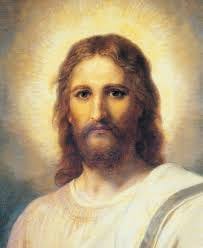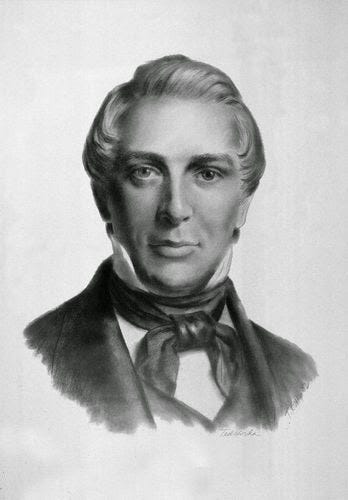That You May Naturally Understand
More Reflections on Doctrine and Covenants 29

Doctrine and Covenants 29 is doctrinally rich and eternally instructive. Interestingly, the beginning of the section addresses events that pertain to the end times, the last days, whereas the end of the section addresses events that pertain to the beginning of time, the creation and the fall. End and beginning, beginning and end, this revelation was given to the Prophet Joseph Smith and six other Elders by Jesus Christ, the Eternal God, Alpha and Omega, the Beginning and the End.
In the previous post we concluded our study with verse 29, and thus we will continue our study in this post beginning with verse 30:
But remember that all my judgments are not given unto men; and as the words have gone forth out of my mouth even so shall they be fulfilled, that the first shall be last, and that the last shall be first in all things whatsoever I have created by the word of my power, which is the power of my Spirit. (D&C 29:30)
This verse reminds me again of the beginning of our study of the Doctrine and Covenants because, unlike the words of mere mortals, the words of the Lord are always fulfilled:
Search these commandments, for they are true and faithful, and the prophecies and promises which are in them shall all be fulfilled.
What I the Lord have spoken, I have spoken, and I excuse not myself; and though the heavens and the earth pass away, my word shall not pass away, but shall all be fulfilled, whether by mine own voice or by the voice of my servants, it is the same. (D&C 1:37-38)
The Lord can’t tell us everything, nor does He tell us everything, but everything He speaks is fulfilled. One of these things that shall be fulfilled is that the first shall be last, and the last shall be first. This section sheds light on the meaning of what may seem like a cryptic phrase as it is recorded in other scriptures. (See, e.g. Matt. 19:30, Matt. 20:16, and Jacob 5:63)
The Lord’s work is eternal and, at least to our mortal understanding, chiastic in nature. In other words, Jesus Christ, the Eternal God, is the Center of the great chiasmus of all creation, and everything that He has created by the word of His power, or the power of His Spirit, appears to us mortals as a chiasmus in which the first shall be last, and the last shall be first. Thus, although this section begins with the end and ends with the beginning, the great chiasmus of all creation is one eternal round:
The works, and the designs, and the purposes of God cannot be frustrated, neither can they come to naught.
For God doth not walk in crooked paths, neither doth he turn to the right hand nor to the left, neither doth he vary from that which he hath said, therefore his paths are straight, and his course is one eternal round. (D&C 3:1-2)
Listen to the voice of the Lord your God, even Alpha and Omega, the beginning and the end, whose course is one eternal round, the same today as yesterday, and forever. (D&C 35:1)
For he is the same yesterday, today, and forever; and the way is prepared for all men from the foundation of the world, if it so be that they repent and come unto him.
For he that diligently seeketh shall find; and the mysteries of God shall be unfolded unto them, by the power of the Holy Ghost, as well in these times as in times of old, and as well in times of old as in times to come; wherefore, the course of the Lord is one eternal round. (1 Nephi 10:18-19)
I perceive that it has been made known unto you, by the testimony of his word, that he cannot walk in crooked paths; neither doth he vary from that which he hath said; neither hath he a shadow of turning from the right to the left, or from that which is right to that which is wrong; therefore, his course is one eternal round. (Alma 7:20)
And it may suffice if I only say they are preserved for a wise purpose, which purpose is known unto God; for he doth counsel in wisdom over all his works, and his paths are straight, and his course is one eternal round. (Alma 37:12)
Remember that we studied the endless and eternal nature of God particularly in D&C 19 and 20, but in this section, section 29, the Lord helps us to understand eternity in terms that make sense to our mortal minds. The Prophet Joseph Smith also desired to reveal eternal truths to us:
It is my meditation all the day, and more than my meat and drink, to know how I shall make the Saints of God comprehend the visions that roll like an overflowing surge before my mind.
Regarding eternity or the meaning of “one eternal round,” the Prophet Joseph Smith taught:
The elements are eternal. That which has a beginning will surely have an end; take a ring, it is without beginning or end—cut it for a beginning place and at the same time you have an ending place. A key: every principle proceeding from God is eternal and any principle which is not eternal is of the devil.— The sun has no beginning or end; the rays which proceed from himself have no bounds, consequently are eternal. So it is with God. If the soul of man had a beginning it will surely have an end. In the translation ‘without form and void’ it should read, empty and desolate. The word created should be formed, or organized.
One of the grand truths that the Prophet Joseph Smith also taught is that as children of God, created in His likeness and image, we (our spirits) are also eternal:
I have another subject to dwell upon, which is calculated to exalt man; but it is impossible for me to say much on this subject. I shall therefore just touch upon it, for time will not permit me to say all. It is associated with the subject of the resurrection of the dead—namely, the soul—the mind of man —the immortal spirit. Where did it come from? All learned men and doctors of divinity say that God created it in the beginning; but it is not so: the very idea lessens man in my estimation. I do not believe the doctrine; I know better. Hear it, all ye ends of the world; for God has told me so; and if you don’t believe me, it will not make the truth without effect. I will make a man appear a fool before I get through; if he does not believe it. I am going to tell of things more noble.
We say that God Himself is a self-existing being. Who told you so? It is correct enough; but how did it get into your heads? Who told you that man did not exist in like manner upon the same principles? Man does exist upon the same principles. God made a tabernacle and put a spirit into it, and it became a living soul. (Refers to the Bible.) How does it read in the Hebrew? It does not say in the Hebrew that God created the spirit of man. It says, “God made man out of the earth and put into him Adam’s spirit, and so became a living body.”
The mind or the intelligence which man possesses is co-equal [co-eternal] with God himself. I know that my testimony is true; hence, when I talk to these mourners, what have they lost? Their relatives and friends are only separated from their bodies for a short season: their spirits which existed with God have left the tabernacle of clay only for a little moment, as it were; and they now exist in a place where they converse together the same as we do on the earth.
I am dwelling on the immortality of the spirit of man. Is it logical to say that the intelligence of spirits is immortal, and yet that it has a beginning? The intelligence of spirits had no beginning, neither will it have an end. That is good logic. That which has a beginning may have an end. There never was a time when there were not spirits; for they are co-equal [co-eternal] with our Father in heaven.
I want to reason more on the spirit of man; for I am dwelling on the body and spirit of man—on the subject of the dead. I take my ring from my finger and liken it unto the mind of man—the immortal part, because it had no beginning. Suppose you cut it in two; then it has a beginning and an end; but join it again, and it continues one eternal round. So with the spirit of man. As the Lord liveth, if it had a beginning, it will have an end. All the fools and learned and wise men from the beginning of creation, who say that the spirit of man had a beginning, prove that it must have an end; and if that doctrine is true, then the doctrine of annihilation would be true. But if I am right, I might with boldness proclaim from the housetops that God never had the power to create the spirit of man at all. God himself could not create himself.
Intelligence is eternal and exists upon a self-existent principle. It is a spirit from age to age and there is no creation about it. All the minds and spirits that God ever sent into the world are susceptible of enlargement.
The first principles of man are self-existent with God. God himself, finding he was in the midst of spirits and glory, because he was more intelligent, saw proper to institute laws whereby the rest could have a privilege to advance like himself. The relationship we have with God places us in a situation to advance in knowledge. He has power to institute laws to instruct the weaker intelligences, that they may be exalted with Himself, so that they might have one glory upon another, and all that knowledge, power, glory, and intelligence, which is requisite in order to save them in the world of spirits.
This is good doctrine. It tastes good. I can taste the principles of eternal life, and so can you. They are given to me by the revelations of Jesus Christ; and I know that when I tell you these words of eternal life as they are given to me, you taste them, and I know that you believe them. You say honey is sweet, and so do I. I can also taste the spirit of eternal life. I know that it is good; and when I tell you of these things which were given me by inspiration of the Holy Spirit, you are bound to receive them as sweet, and rejoice more and more.
Returning to D&C 29, perhaps these things can help us to better understand not only the eternal nature of God, but also the eternal nature of His creation:
For by the power of my Spirit created I them; yea, all things both spiritual and temporal—
First spiritual, secondly temporal, which is the beginning of my work; and again, first temporal, and secondly spiritual, which is the last of my work—
Speaking unto you that you may naturally understand; but unto myself my works have no end, neither beginning; but it is given unto you that ye may understand, because ye have asked it of me and are agreed. (D&C 29:31-33)
I love these verses. The Lord teaches us that if we could understand things as He does, or if we could understand the meaning of eternity, then we would know what it means for His works to be without beginning or end. But because eternity is something that is difficult for our mortal minds to grasp, the Lord teaches us in a way that we may “naturally understand.” How can we begin to fathom the meaning of eternity and the eternal nature of the Lord’s works? Because we mortals think in temporal or natural terms, the Lord teaches us in terms that we may naturally understand, at least until He reveals eternal things unto our eternal spirits:
All things whatsoever God in his infinite wisdom has seen fit and proper to reveal to us, while we are dwelling in mortality, in regard to our mortal bodies, are revealed to us in the abstract, and independent of affinity of [connection to] this mortal tabernacle, but are revealed to our spirits precisely as though we had no bodies at all (Teachings of Presidents of the Church: Joseph Smith [2007], 475)
In the foregoing verse the Lord divides His creation into spiritual and temporal, beginning and end, in order that we may naturally understand. The beginning of the Lord’s work was first spiritual and secondly temporal, and the last of His work is first temporal and secondly spiritual. It is a chiasmus, the Center Point of which is Jesus Christ, who is Endless and Eternal.
Like the Prophet Joseph Smith, Moses learned of the eternal nature of God’s creation when he inquired of the Lord:
And God spake unto Moses, saying: Behold, I am the Lord God Almighty, and Endless is my name; for I am without beginning of days or end of years; and is not this endless?
And, behold, thou art my son; wherefore look, and I will show thee the workmanship of mine hands; but not all, for my works are without end, and also my words, for they never cease. (Moses 1:3-4)
And I have a work for thee, Moses, my son; and thou art in the similitude of mine Only Begotten; and mine Only Begotten is and shall be the Savior, for he is full of grace and truth; but there is no God beside me, and all things are present with me, for I know them all. (Moses 1:6)
And worlds without number have I created; and I also created them for mine own purpose; and by the Son I created them, which is mine Only Begotten. (Moses 1:33)
And as one earth shall pass away, and the heavens thereof even so shall another come; and there is no end to my works, neither to my words.
For behold, this is my work and my glory—to bring to pass the immortality and eternal life of man. (Moses 1:38-39)
After speaking unto us that we may naturally understand, the Lord explains His was of seeing things:
Wherefore, verily I say unto you that all things unto me are spiritual, and not at any time have I given unto you a law which was temporal; neither any man, nor the children of men; neither Adam, your father, whom I created. (D&C 29:34)
All the distinctions of first and last, beginning and end, spiritual and temporal, are distinctions that the Lord makes in order to help us to understand His creation and His way of seeing things. From His Divine point of view, however, all things are spiritual. From His Divine point of view, all things are present before Him in an ETERNAL NOW.
Let’s consider what Smith and Sjodahl’s commentary contributes to our study of the foregoing verses:
All my judgments are not given unto men] Our Lord has not revealed all the rewards in store for the righteous. There will be an infinite variety in the conditions of the blessed. Nor has He revealed the final fate of the wicked. But one truth is clearly revealed: - “The first shall be the last, and the last the first.”
All things, both temporal and spiritual, are created. There is a pre-existence.
The first creation was spiritual, the second temporal. The temporal will again become spiritual, and the first will become the last, as the last is the first, or, in other words, the spiritual existence is both first and last.
However, the expression “first” and “last” are only employed for the sake of human understanding. From the divine point of view there is neither beginning nor end. God’s works are as eternal as He is. This is beyond human understanding, except in so far as the poetic imagination offers an explanation:
“Nature is but a name for an effect
Whose cause is God. He feeds the secret fire
By which the mighty process is maintained.
[All things] are under one. One Spirit, His
Who wore the platted thorns with bleeding brows,
Rules Universal nature.” - Cowper
And are agreed] Note that this Revelation was given in answer to united prayer by the Elders in the house of the Prophet. (p. 156)
In the following post we will study how the Lord, from His Divine point of view and exalted station, then unfolds His Eternal Plan of Salvation to Joseph Smith and the six Elders who were with him.








